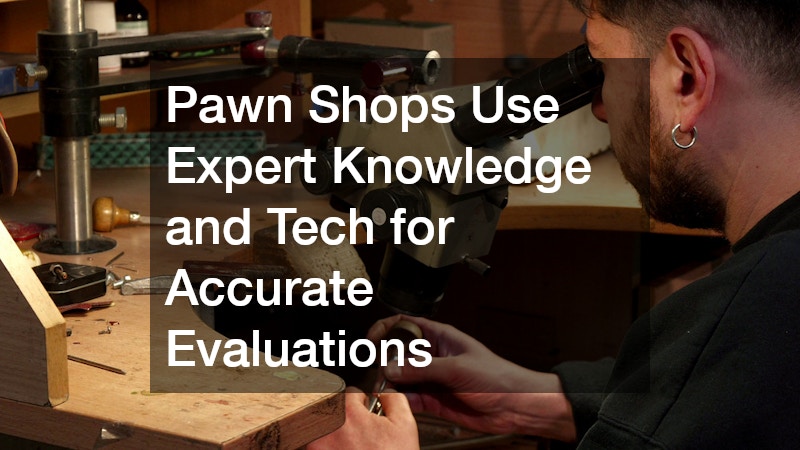Pawn shops play a crucial role in providing an immediate cash option for those looking to sell or pawn their jewelry. The process of evaluating jewelry pieces accurately is vital to ensure fair transactions for both the pawn shop and the customer.
The evaluation process involves examining various factors that contribute to the jewelry’s overall worth. This article explores how pawn shops assess the value of jewelry before making offers, emphasizing the importance of detailed evaluations in the industry.
What Factors Do Pawn Shops Consider During a Jewelry Evaluation?
Assessing the Quality of Materials
When evaluating jewelry, pawn shops first examine the quality of materials such as metals and gemstones. Understanding the karat of gold or the clarity of a diamond can significantly affect the item’s valuation.
Pawn shops employ a variety of methods to determine the purity of metals using acid tests or electronic testers. Similarly, for gemstones, factors such as cut, color, clarity, and carat weight are meticulously assessed.
Knowing the intrinsic value of these materials helps pawn brokers to estimate a base value. This initial assessment allows them to make informed decisions on potential offers and overall pricing.
Condition and Wear Analysis
The condition of jewelry, including signs of wear and damage, significantly influences its valuation. Pawn shops carefully inspect pieces for any visible scratches, missing stones, or signs of repair.
Any noticeable wear can lead to a decrease in the jewelry’s appraised value. Conversely, items that have been well-maintained and show minimal signs of wear typically command higher offers.
Pawn brokers must consider potential restoration costs that would require repairing damaged items. This helps them determine how much they can reasonably offer a seller for a particular piece.
How Do Pawn Shops Authenticate Jewelry?
Certification and Markings
Another critical layer of evaluation is the authentication of jewelry pieces. Certifications from reputable institutes or engraved markings serve as proof of authenticity for precious items.
Certificates often include detailed information about the jewelry, such as type, weight, and quality, which helps pawn shops verify claims made by sellers. Established markings on jewelry, like those indicating the metal’s purity, are also vital clues.
Authentication is essential to avoid the risk associated with counterfeit items. With authentic pieces, pawn shops provide more accurate valuations and offers, enhancing the trust between them and their clientele.
Use of Specialized Equipment
Pawn shops also rely on specialized equipment to authenticate jewelry pieces accurately. Tools like diamond testers and spectrometers provide clear indications of a piece’s authenticity.
These instruments help distinguish between genuine gemstones and fakes. The technology available to pawn brokers allows them to perform precise tests that are often beyond the capabilities of naked-eye evaluation.
While technology supports the evaluation process significantly, pawn shops also rely on the expertise and experience of trained appraisers. This combination ensures a comprehensive and reliable assessment of the jewelry.
What is the Role of Market Trends in Jewelry Valuation?
Current Demand for Precious Metals and Stones
The fluctuations in market demand for precious metals and stones have a direct impact on jewelry valuation. A surge in demand for gold or diamonds, for example, typically raises the appraisal value of these items.
Pawn shops stay abreast of market trends to align their offers with current values. Tracking such trends allows them to adjust their buying strategies accordingly.
This can lead to higher offers for jewelry during times of increased demand. Market knowledge empowers pawn brokers to make informed decisions about their inventory and offer strategies.
Impact of Fashion Trends
Fashion trends also play a significant role in the evaluation process at pawn shops. Certain designs and styles may gain popularity, leading to a higher appraisal value.
Pawn brokers consider the desirability of an item based on current fashion trends when making offers. Classic styles may offer sustained value, whereas trends that have suddenly spiked can lead to a higher immediate return.
Understanding these trends helps pawn shops cater to buyers looking for fashionable pieces. It also influences how they organize and price their inventory.
How Does Previous Ownership History Affect the Offer?
Influence of Provenance
Provenance refers to the ownership history of a jewelry piece, which can add to its charm and value. Certain items that have belonged to celebrities or hold historical significance often fetch better offers.
Pawn shops take provenance into consideration, as a compelling backstory can increase a piece’s desirability among collectors or enthusiasts. Verifiable history can add a layer of value that goes beyond material worth.
This aspect of evaluation requires both documentary evidence and expert validation. It transforms ordinary items into coveted treasures, leading to potentially higher offers.
Negotiation Leverage
Previous ownership history can also act as a valuable tool during negotiations with pawn shops. Sellers armed with verified historical documentation can leverage this to secure better offers.
During the evaluation, pawn shops consider such documentation to justify higher buying prices. Conversely, items lacking historical data or having negative associations may see diminished valuations.
This negotiation process is a critical aspect of the pawn industry. It allows sellers and buyers to reach a mutual agreement that reflects both the material and historical value of the jewelry.
The comprehensive jewelry evaluation process employed by pawn shops is essential to making informed offers for jewelry pieces. Factors such as material quality, condition, authenticity, market trends, and provenance are all considered.
Pawn shops combine traditional expertise with advanced technology to perform precise evaluations. Understanding this complex process can help potential sellers make educated decisions when engaging with pawn shops for their jewelry transactions.

